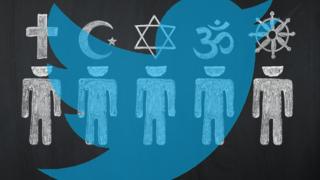Twitter Bans Religious Insults Calling Groups Rats Or Maggots

 Image copyright
Twitter/Getty Images
Image copyright
Twitter/Getty Images
Twitter is updating its hate-speech rules to ban posts that liken religious groups to rats, viruses or maggots, among other dehumanising terms.
Over time, the ban would be extended to cover to some other groups, it said.
But a public consultation had indicated users still wished to use dehumanising language to criticise political organisations and hate groups.
Tech companies have struggled to strike a balance between free expression and protecting users from attack.
Twitter said it had taken "months of conversations" to decide on the policy.
"Our primary focus is on addressing the risks of offline harm - and research shows that dehumanising language increases that risk," the company said in a blog.
Account suspensions
Twitter's hateful conduct policy had already banned users from spreading scaremongering stereotypes about religious groups - such as claiming all adherents were terrorists.
In addition, it had prohibited the use of imagery that might stir up hatred, including photos edited to give individuals animal-like features or add "hateful symbols" such as the yellow Star of David badges associated with the Holocaust.
One UK-based civil rights campaign group said the latest move was "very belated".
"Twitter's known that it's had a problem with people using hate speech to target, harass and abuse people on the basis of their religious background for a long time," said Matthew McGregor, Hope Not Hate's campaigns director.
"So, it's been incredibly disappointing to see Twitter drag its feet over this.
"At the same time, their move today is welcome. But I think a lot of campaigners will want to see the extent to which this policy is implemented."
Twitter said it would respond to user reports as well as employ machine-learning tools to automatically flag suspect posts for review by human moderators.
Offenders face having their accounts suspended, although not for cases that occurred before the rule came into effect.
Twitter's action comes a fortnight after it said it would start hiding tweets by world leaders and politicians that broke its rules behind a warning notice. Prior to this, it had made an exception for them.
More recently, Facebook's Instagram has taken steps of its own to discourage bullying, asking users: "Are you sure you want to post this?" if it determines a message to be abusive.
However, some free speech advocates have raised concerns about the degree to which the tech giants are tightening their rules and have suggested using smaller, less-regulated alternatives such as Gab and Bitchute instead.
Trump's summit
On Thursday, the White House plans to host a social media summit for what a spokesman said would be a "robust conversation on the opportunities and challenges of today's online environment".
Invitees are reported to include conservative organisations and individuals, some of which have raised concerns about "censorship" and the restricted distribution of their posts.
President Trump recently accused tech leaders of favouring his Democratic rivals and said Twitter in particular should be sued as a consequence.
The social network has rejected claims of bias and has said its focus is to create a "healthier service".
A spokeswoman for Twitter declined to say if it had been asked to attend the Washington DC meeting.
Facebook has confirmed it has not been invited.
Block ban
In a related development, a US appeals court has ruled that President Trump must not block people from following him on Twitter.
The Second US Circuit Court of Appeals' 3-0 decision upholds an earlier ruling from a lower court.
The case dates back to a lawsuit filed in 2017 when seven people sued the commander-in-chief for preventing them from seeing or responding his tweets.
The appeals court has confirmed that this was a violation of their First Amendment right to free speech.
The Justice Department had previously described this reasoning as being "fundamentally misconceived" on the basis that the President used Twitter in a personal capacity.
Neither it nor the White House has responded to the latest ruling.
From Chip War To Cloud War: The Next Frontier In Global Tech Competition
The global chip war, characterized by intense competition among nations and corporations for supremacy in semiconductor ... Read more
The High Stakes Of Tech Regulation: Security Risks And Market Dynamics
The influence of tech giants in the global economy continues to grow, raising crucial questions about how to balance sec... Read more
The Tyranny Of Instagram Interiors: Why It's Time To Break Free From Algorithm-Driven Aesthetics
Instagram has become a dominant force in shaping interior design trends, offering a seemingly endless stream of inspirat... Read more
The Data Crunch In AI: Strategies For Sustainability
Exploring solutions to the imminent exhaustion of internet data for AI training.As the artificial intelligence (AI) indu... Read more
Google Abandons Four-Year Effort To Remove Cookies From Chrome Browser
After four years of dedicated effort, Google has decided to abandon its plan to remove third-party cookies from its Chro... Read more
LinkedIn Embraces AI And Gamification To Drive User Engagement And Revenue
In an effort to tackle slowing revenue growth and enhance user engagement, LinkedIn is turning to artificial intelligenc... Read more

